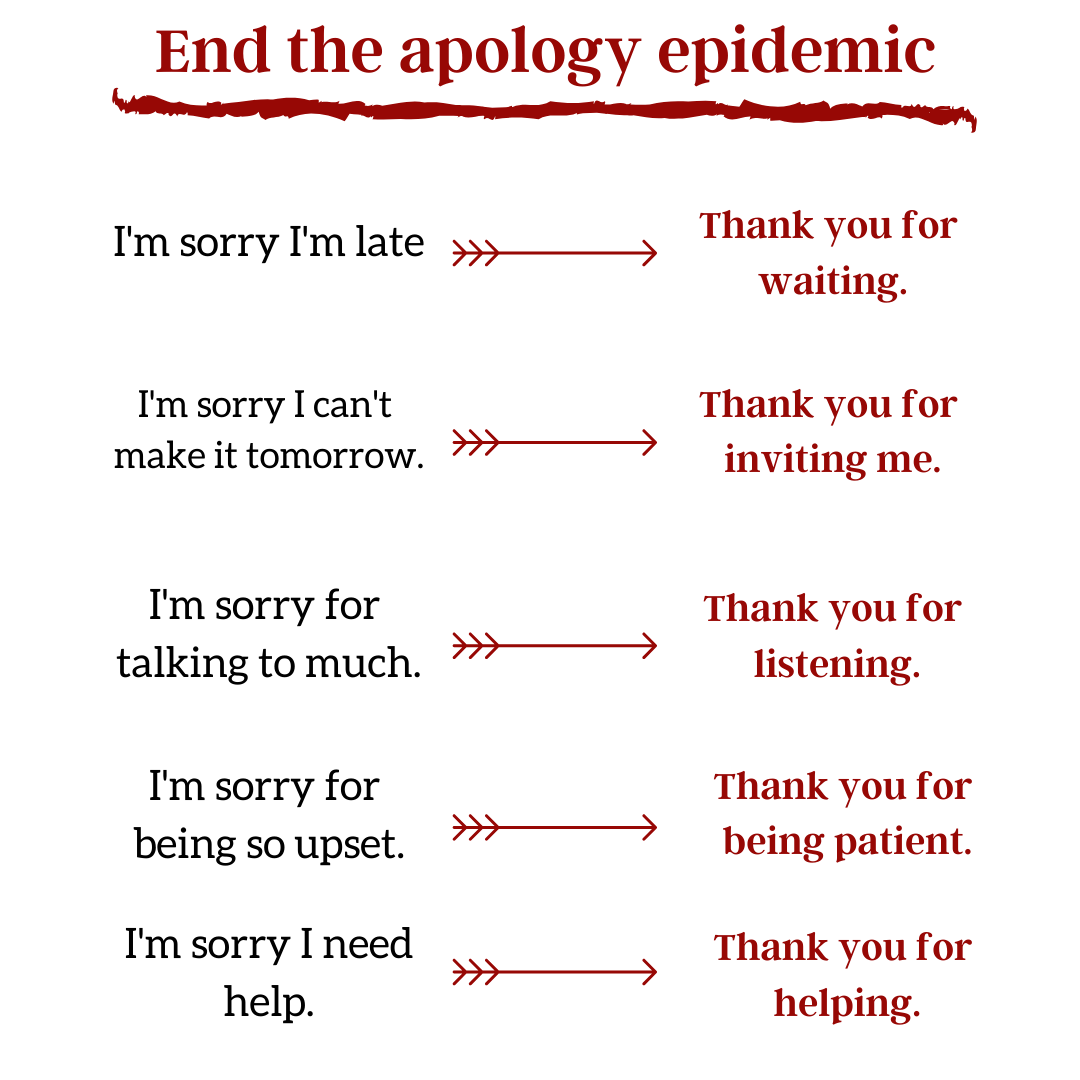You walk into your favorite cafe and bump into someone in line…“I’m sorry.”
You get to the front of the line, flustered, unsure of what to order… “I’m sorry, just one moment,” you tell the barista.
You get your coffee and sit down with your friend…“I’m sorry I’m late. Traffic was crazy.”
Sound remotely familiar? I get it, this was me once. I wanted everything to be peaceful and everyone to feel supported and welcomed at all times. As a result, I was willing to sacrifice my own integrity and worth making sure everyone else was okay.
After one too many apologies it hit me.
All these “I’m sorry’s” weren’t actually anything worth apologizing for and there were far better ways to create peace and build healthy relationships.
The tiniest words can make the biggest impact on your life. The overuse of the words “I’m sorry” has even been coined “The apology epidemic”. And ladies, this is largely for you, considering women are reported to apologize far more than men. This phrase has become almost a way of life that does more harm than good.
Once I began to hear it in myself, I began to hear it everywhere, for everything! This sent me on a trail to determine how these words impact life and what is more suitable to say in their place.
Here is why you should get off the apology train and 3 things you can say instead.
1. You lose respect from others.
Your apology might actually be hurting you more than you think. A study from Dartmouth College and the University of Texas found that when someone apologizes, they can actually feed the fire of an already upset person. An apology can trigger someone, and according to the study make them more likely to seek revenge on you.
2. You become the boy who cried wolf.
When you walk around apologizing for everything, you water down any future apology that actually meant something, and everything becomes white noise.
When it comes time to genuinely apologize for something substantial, it won’t make as much of an impact on the receiver. You become the boy (or girl) who cried… “I’m sorry” and now there is no one there to listen and receive it.
3. You don’t like yourself as much.
When you walk around apologizing for well, basically existing, you lower your self-esteem.
Studies have found the more you apologize for things you do, the lower your self-worth becomes. The most successful people are the least likely to apologize and express a higher sense of integrity. This doesn’t mean don’t admit your faults, it means to stand in your worth.
Because the truth is, saying sorry puts you into an inherently submissive position. And unless you are partaking in some dominatrix movie scene, this isn’t likely where you want to live. By apologizing for something unnecessarily, you’re implying that you’re seeking approval.
When you apologize for something, it means you are asking someone for forgiveness. So think long and hard before you apologize about whether its an act that warrants forgiveness. Does asking a question warrant forgiveness? Does telling a salesperson your not interested in their product need to be forgiven? Does borrowing a chair at a restaurant warrant forgiveness?
4. You put people in a place to comfort or apologize for no reason.
When someone apologies to you for something unnecessary, how do you respond? Likely something along the lines of: “Oh, no you are totally fine, I should’ve…”
By unnecessarily apologizing you have created this loop of discrediting and calling out personal faults. It puts the receiver in a place to come up with some form of comfort or reason why you aren’t at fault or in trouble.
A study found that by apologizing for rejecting someone (canceling a dinner plan or breaking up with someone) actually makes the rejecter feel worse and pigeonholed into forgiving you unnecessarily.
5. It’s annoying.
Haircare brand Pantene shared a “Sorry, Not Sorry” commercial that opens with women apologizing left and right for things. It’s painful to watch and hard to hear, especially given that none of the actions warranted an apology. Luckily, the video goes on to reshow the same moments played out with the women speaking strongly and shining bright, no apologies needed. Pantene ‘Sorry, Not Sorry’ Commercial
We walk around apologizing for things because we want to be good and kind people, we want to be liked. But there are ways to do this without losing respect for yourself and others. All of this can easily be avoided. In fact, I have found three sayings as far more positive to build relationships.
What to say instead:
1. Thank you.
Instead of apologizing for being late or making a small mistake, thank the other person for their patience and their kindness. This takes the fault or topic and immediately puts it into a positive light and creates a conversation rooted in gratitude as opposed to faults.
Here are a few examples:

2. Excuse me.
Have you ever been in a crowded line, train, or grocery store aisle? You inevitably bump into someone and both of you reactively squawk, “I’m sorry.” Sure, you didn’t mean to bump into them, but you also don’t need to necessarily dive into an apology.
I can be a clumsy person, and if I walked around apologizing to every person I bumped shoulders with, I could probably fill a Superbowl stadium. I have found this saying far more impactful:
“Excuse me.”
It’s that simple. And if it was a hard hit, which is highly unlikely unless you are a football linebacker, follow it up with an, “Are you okay?”
3. I’m here for you.
When people go through hard times or have a loss in their life, it is so commonplace to upchuck the saying, “I’m sorry for your loss, for your struggle,” etc.
Unless you are the reason behind their loss or struggle, you have nothing to apologize for. So don’t feel obligated to say, I’m sorry.
What I have found to be more applicable and far more supportive is letting them know you are there for them and support them during their difficult time.
Try this:
“I am here for you and would like to support you in whatever way you need most.”
Shower them with support instead of more sadness and negativity. Save the apologies for when you genuinely make a mistake or do something hurtful. The words will be more powerful for you, and the receiver.
No longer apologizing unnecessarily has left me feeling more grateful for others, including myself. Sorry, not sorry!
This article first published on Medium.


